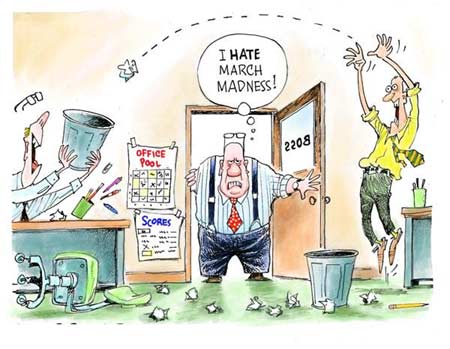
By B.G. Kelley
盛开 选注
It’s funny how friendships begin.
One day on a basketball court in Philly I was chasing after a loose ball, and the opponent going after it with me swung an elbow that caught my lip.[1]
I wiped away the blood with the shirt-tail of my jersey, but I wanted payback.[2] With 15 seconds remaining in the game and the score tied[3] at 78, I had the ball in my hands. The same guy bellied up hard on defense.[4] I went up for the game-winning jump shot[5]. As he leaped to block my shot, I fended him off with my left forearm and released the ball at the buzzer.[6] Swish[7]. Walking off the court, he came up to me, and introduced himself.
“Smooth game you got,” he said.
“Can’t say the same,” I said.
“Sorry about the lip.”
“Forget about it.”
We went for a Coke[8].
Other than basketball, Flash Gordon and I had nothing else in common.
Flash grew up in a home for boys—his father had run off when he was 4 or 5 and his mother was too sick to rear[9] him. The boys’ home wasn’t the cleanest or quietest place. The food didn’t put a warm feeling in his belly. But there was a tiny gym[10] on the third floor. Basketball became his best friend. On the other hand, I had it middleclass comfortable: concerned parents, a hot dinner every night, a car at my beckoning[11]. Any problems were illusions. Basketball was my passion, too. So, for Flash and me, there was never any reason to fuss with metaphysics[12] when a game could be had. Basketball became an overarching theology that seemed to order things in our lives.[13]
The court was the one place where we were both completely at ease, where we could release ourselves in a reverse spin dribble past a defender, or in a high-arching, high-speed spinning jump shot that dropped through the basket.[14]
We played together everywhere: All around Philly, in the Poconos, at the Jersey Shore, up on Cape Cod bay, even in Quebec in Canada. We became well-known as Flash Gordon and Billy the Kid. Especially the game this particular March night when we would write our basketball oeuvre[15] as teammates.
The team on which we were playing was vying for the championship in a semi-pro league in Philly.[16] In warm-ups, Flash said to me, “Shoot the lights out as only you can and we’ll whip these hotshots.[17] I’ll take care of the rest.” That meant Flash would hustle after every loose ball, bang bodies under the boards for rebounds, and play Velcro-like defense.[18] We were the decisive underdogs[19], not only because we were both 36 years old, as was the rest of our team, but also because we were going up against a bunch of young, former college stars—20-somethings—who had gone unbeaten in winning the regularseason championship.
The referee’s shrill whistle signaled game time.[20] Flash, fired up, uncoiled his lithe 5-foot, 8-inch frame and hustled hard to track down the tip. He grabbed the ball, whirled, and whipped a pass to me at the top of the key.[21] Swish. I hit my first eight shots and we jumped to a 32-20 lead.
“Keep shooting,” he shouted to me. Flash has always been my biggest booster[22]. He had come to almost every game I had played as a starting point guard for Temple University, including the game I played in the NCAA Tournament, aka “March Madness.”[23]
I kept shooting and he kept “doing the rest,” and we went on to collect the gold and glory that night. At the final buzzer, Flash raced over, put his arm around my shoulder, and said, “See, buddy[24], I told you we’d win.” His lips peeled back into a huge smile. It was his first-ever championnship—there were no championships growing up in that boys’ home.
In that giddy blush of triumph we promised like some Philadelphia Huck Finn and Tom Sawyer to play the game side by side forever, to remain, as the poet Schiller wrote, “true to the dreams of thy youth.”[25]
Vocabulary
1. court: 球场;Philly: 费城,美国城市Philadelphia的俗称,下文中还出现了一些地名,不一一作注;swing: 挥动拳头(或手臂)打击。
2. shirt-tail: 衬衣下摆;jersey: 运动衫;payback: 报复。
3. tie: 打成平局,得相等比分。
4. 还是那个家伙使劲扬起身体准备防守。
5. jump shot: 跳投。
6. fend off: 抵挡,挡开;at the buzzer :( 尤指篮球的比赛)结束。
7. swish:〈口〉漂亮的。
8. Coke: 可乐。
9. rear: 养育。
10. gym: 体育馆。
11. beckoning:(用手或头的动作)示意,召唤。
12. metaphysics: 空谈,空头理论。
13. overarching: 支配一切的,首要的;theology: 某种宗教信仰。这两句话都表示两人酷爱篮球,将之摆在首位。
14. 篮球场是我们两人唯一可以完全放松的所在:我们经过防守队员时反转运球,或者在投篮时大弧度地快速跳投——在这中间我们释放着自己。
15. oeuvre: (一名作家或画家的)全部作品。
16. vie for: 为……而竞赛;semi-pro: 半职业的。
17. warm-up: 热身赛;shoot the lights out: 击灭灯火,此处用比喻义,表示“投进每一个球”;whip these hotshots: 彻底击败那些高手(好手)。
18. 那意味着弗莱士要去追赶每一个丢了的球,撞开对手的身体去抢篮板球,并实施魔术贴般的防御。
19. underdog: 失败者。
20. referee: 裁判;shrill: 尖锐刺耳的。
21. 热情高涨的弗莱士,伸直他那轻巧自如的5英尺8英寸的身体,奋勇抢球。他抓住了球,转身,在千钧一发的时刻迅速把球传给了我。
22. booster: 热情的支持者。
23. NCAA Tournament: 男子篮球锦标赛,又名“三月疯狂”(March Madness),是全美收视率最高的运动盛事之一;aka: =also known as。
24. buddy:〈俚〉家伙,老兄。
25. giddy: 令人眩晕的;Huck Finn:《哈克贝里•芬历险记》里的主人公;Tom Sawyer:《汤姆•索亚历险记》里的主人公,两部书都是美国作家马克•吐温的作品;Schiller: 席勒(1759—1805),德国诗人、戏剧家和文学理论家,与莱辛和歌德齐名,同为德国古典文学的创始人。
(来源:英语学习杂志)